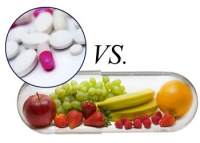Vitamins: Choosing Supplements
Approximately half the population in western countries takes supplements on a daily basis. Women, children, a growing aging population, and increasing consumer awareness about general health heavily contributes to the popularity of supplements. The global supplement market is $82 billion and the US contributes $37 billion to that number. Faced with countless options and a worldwide market, choosing supplements can be overwhelming. Rarely are consumers supplied with sufficient scientific information upon which to base their decisions and they usually rely on a company’s marketing materials.
There are lot of misunderstandings about supplements due to controversial information presented to the medical community and consumers, especially information about serious health issues such as cancer. About 80-90% of cancer patients take some form of supplements, and most take a random combination of different supplements without knowing their efficacy and interactions.
Most popular supplements are either individual components such as a single vitamin, individual plant extracts such as green tea extract or curcumin, or they are a random combination of various micronutrients. The majority of formulas that contain multiple nutrients and plant extracts do not clearly state any criteria for their ingredient selection. Little attention is paid to their combination in varied doses, whether such combinations work together, or if some ingredients may offset the action of others within the body. If there are specific claims, they may often be supported by general statements from published research conducted by others and they are related to individual ingredients instead of the ingredient combination. The ultimate focus is on revenue rather than the consumer’s health.
The Dr. Rath Research Institute conducts academic research in the area of natural health which forms a scientific basis for the development of unique synergy based micronutrient combinations. Taking into account consumer confusion regarding the efficacy of various supplements, we conducted a study comparing the effects of different nutritional formulas and how they affect the growth of cancer cells. In an earlier study, we presented one such comparison showing marked differences in the efficacy of different supplements in protecting cells from oxidative stress.
In our recently published study*, we compared the efficacy of different supplements on the growth of cancer cells (melanoma and liver cancer) and normal cells. We used some popular supplements in the European market and the synergy based nutrient combination developed by our scientists. The results showed that the synergy combination was successful in inhibiting the growth of melanoma cells almost completely. However, five out of six commercial supplements increased the growth of melanoma cells and, on average, they stimulated melanoma cell growth by 109%. In order to find out whether this effect was limited to one specific cancer type, we also tested the comparative effects on liver cancer cells. Similar to melanoma, the synergy combination showed inhibitory effects and the commercial brands showed stimulatory effect on liver cancer cells. When compared with normal human skin cells, the synergy combination had stimulatory effect (10-50% increase), while the commercial brands inhibited the growth of normal skin cells on average by 20%.
While supplements are not a cure for cancer, they have remarkable benefits to support the immune system, to reduce free radical damage and to optimize health. An aware consumer takes supplements hoping that they will help him or her to stay healthy. However, it is also important to know the scientific basis and efficacy of the supplements.
*M Chatterjee, et al., Journal of Cellular Medicine and Natural Health, 2017
